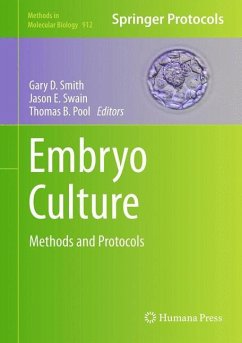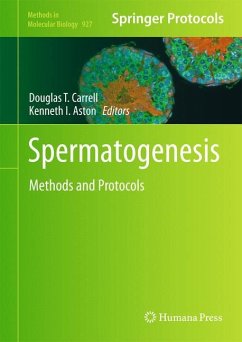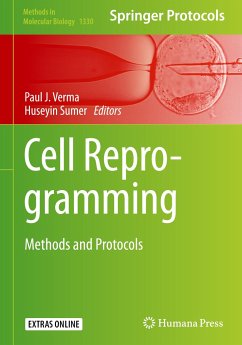
Vertebrate Embryogenesis
Embryological, Cellular, and Genetic Methods
Herausgegeben: Pelegri, Francisco J.

PAYBACK Punkte
57 °P sammeln!
One of the striking findings of modern developmental biology has been the high degree of conservation of signaling and developmental mechanisms amongst different animal species. Such conservation allows information learned from a given organism to be applicable to other species, including humans, and has validated the use of a few model systems to deduce general biological principles. In spite of this underlying conservation, however, each species has unique characteristics arising from its evolutionary history. Vertebrate Embryogenesis: Embryological, Cellular and Genetic Methods attempts to address the increasingly important need of straddling species boundaries in the context of a single research program by compiling research protocols used in a wide range of vertebrate species. In fact, this volume has been designed so that readers can readily find information on species other than the one with which they may be most familiar. These protocols include not only embryological methods, but also cellular and genetic approaches that have complemented and expanded our understanding of embryonic development. In addition, a number of chapters highlight a specific method that is in principle applicable to multiple species, such as TILLING and ZFN-mediated mutagenesis, the generation of Embryonic Stem (ES) cell lines, and nuclear/oocyte transfer. Written in the highly successful Methods in Molecular Biology(TM) series format, chapters contain introductions to their respective topics, lists of the necessary materials and reagents, step-by-step, readily reproducible laboratory protocols, and notes on troubleshooting and avoiding known pitfalls.
Authoritative and accessible, Vertebrate Embryogenesis: Embryological, Cellular and Genetic Methods serves as an ideal guide to the molecular, cell, and developmental biology community and will hopefully contribute to the ongoing collective effort towards a better understanding of the beauty and logic of vertebrate development.
Authoritative and accessible, Vertebrate Embryogenesis: Embryological, Cellular and Genetic Methods serves as an ideal guide to the molecular, cell, and developmental biology community and will hopefully contribute to the ongoing collective effort towards a better understanding of the beauty and logic of vertebrate development.














